
Paul Abraham Dukas was a French composer, critic, scholar and teacher. A studious man of retiring personality, he was intensely self-critical, having abandoned and destroyed many of his compositions. His best-known work is the orchestral piece The Sorcerer's Apprentice, the fame of which has eclipsed that of his other surviving works, largely due to its usage in the 1940 Disney film Fantasia. Among these are the opera Ariane et Barbe-bleue, his Symphony in C and Piano Sonata in E-flat minor, the Variations, Interlude and Finale on a Theme by Rameau, and a ballet, La Péri.
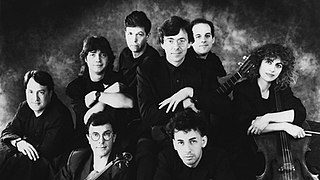
The Penguin Cafe Orchestra (PCO) were an avant-pop band led by English guitarist Simon Jeffes. Co-founded with cellist Helen Liebmann, the band toured extensively during the 1980s and 1990s. The band's sound is not easily categorized, having elements of exuberant folk music and a minimalist aesthetic occasionally reminiscent of composers such as Philip Glass.
John Arthur Lanchbery OBE was an English-Australian composer and conductor, famous for his ballet arrangements. He served as the Principal Conductor of the Royal Ballet from 1959 to 1972, Principal Conductor of the Australian Ballet from 1972 to 1977, and Musical Director of the American Ballet Theatre from 1978 to 1980. He continued to conduct regularly for the Royal Ballet until 2001.

The Penguin Cafe Orchestra Mini Album is an EP by Penguin Cafe Orchestra consisting of six pieces, two derived from previous released recordings, two that were recorded from a live performance in Tokyo, and two previously unreleased pieces which had not appeared elsewhere. The two live pieces were recorded by NHK Radio at the Kan-i Hoken Hall on 10 June 1982. "Piano Music" is a solo piece recorded by Simon Jeffes in Tokyo on 7 July 1982 and "The Toy" was recorded in 1983. The cover painting was by Emily Young.

Penguin Cafe Orchestra is the second studio album by the Penguin Cafe Orchestra, released in 1981, and recorded between 1977 and 1980. By this album, the line-up for the band had expanded greatly, with contribution including Simon Jeffes, Helen Leibmann, Steve Nye, Gavyn Wright of the original quartet, as well as Geoff Richardson, Peter Veitch, Braco, Giles Leamna, Julio Segovia and Neil Rennie. All pieces were composed by Simon Jeffes except for "Paul's Dance", "Cutting Branches" (traditional), and "Walk Don't Run". The cover painting is by Emily Young.

Music from the Penguin Cafe is the first studio album by the Penguin Cafe Orchestra. It was recorded between 1974 and 1976, and released in 1976.

Simon Harry Piers Jeffes was an English classically trained guitarist, composer and arranger. He formed, and was the primary performer of, the Penguin Cafe Orchestra. He was the composer of the ballet Still Life at the Penguin Cafe, of the much-recorded piece Music For A Found Harmonium, and other music recorded by the Penguin Cafe Orchestra.
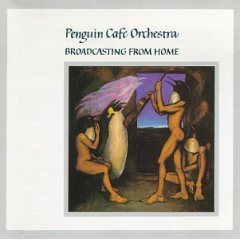
Broadcasting from Home is the third studio album by the Penguin Cafe Orchestra, released in 1984 on E.G. Records. The opening song was named after PCO leader Simon Jeffes found a discarded harmonium in an alleyway in Japan.
Gordon Crosse was an English composer.
Helen Liebmann was a founding member of the avant garde music group Penguin Cafe Orchestra in 1973. A cellist, she studied at the Royal Academy of Music. In addition to playing cello with a number of different ensembles, she is also a practicing music therapist.

Unfinished Picture is an album by Rupert Hine. It was originally released in 1973, by Purple Records, and re-released on CD in 1988 by Line Records. It was recorded at the Church of Saint Mary Magdalene, Paddington, London.

The Confessions of Dr. Dream and Other Stories is the fifth studio album by Kevin Ayers. Ayers moved to Island Records for this release which employed a vast array of session musicians. The album also marked the arrival of Patto guitarist Ollie Halsall, who would become a constant musical partner for Ayers. Other notable musicians are ex-King Crimson drummer Michael Giles, and Steve Nye and Simon Jeffes of the Penguin Cafe Orchestra. The album was critically acclaimed on release with the NME's Nick Kent describing it as "Ayers' most formidable recorded work to date". The album features many of Ayers' most accessible songs and arrangements.

Signs of Life is the fourth studio album by the Penguin Cafe Orchestra. It was recorded at the Penguin Cafe between 1985 and 1987 and released in March 1987. It includes "Perpetuum Mobile", one of their most famous pieces. The album reached number 49 in the UK Albums Chart.
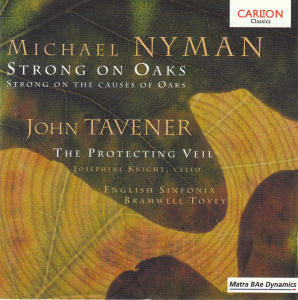
Strong on Oaks, Strong on the Causes of Oaks is a 1998 album by the English Sinfonia conducted by Bramwell Tovey. The work, by Michael Nyman, is paired with The Protecting Veil by John Tavener featuring Josephine Knight on the cello. The photography and liner notes indicate that Nyman was directly involved in the album, the premiere recording of the work, while Tavener, whose piece, was eleven years old at the time of the recording, has been recorded more than once, is represented by a headshot and stock commentary from Richard Steinetz.
The Prince of the Pagodas is a ballet created for The Royal Ballet by choreographer John Cranko with music commissioned from Benjamin Britten. Its premiere took place on 1 January 1957 at the Royal Opera House, Covent Garden, London, conducted by Britten.
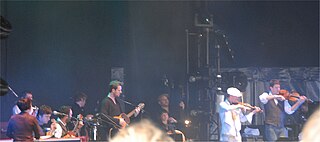
Penguin Cafe is a band originally conceived by Arthur Jeffes, son of Simon Jeffes and Emily Young, as a continuation of his father's project, the Penguin Cafe Orchestra. The group is distinct from the original Penguin Cafe Orchestra, despite the similarities in genre, name, and even repertoire There are no members of the original PCO in Penguin Cafe.
Aaron Robison is a British ballet dancer and currently a Principal Dancer with San Francisco Ballet. He was previously a Lead principal dancer with English National Ballet.
Arthur William Phoenix Young Jeffes is an English composer, musician, and arctic explorer. He is the frontman of the musical group Penguin Cafe, a group he formed in 2007 to play the music of his father's band, the Penguin Cafe Orchestra. He is one half of the band Sundog.
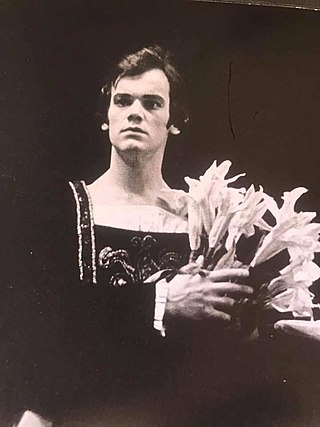
Stephen Jefferies is a retired ballet dancer, artistic director and choreographer. He was a senior principal dancer for The Royal Ballet and The National Ballet of Canada.

Union Cafe is the fifth and final studio album by the Penguin Cafe Orchestra, released in 1993 under the Zopf label. The album was originally released only as a CD and cassette. It was never released on vinyl until 2017, when a double LP edition was finally released under the Erased Tapes label to commemorate the 20th anniversary since Simon Jeffes' passing.













